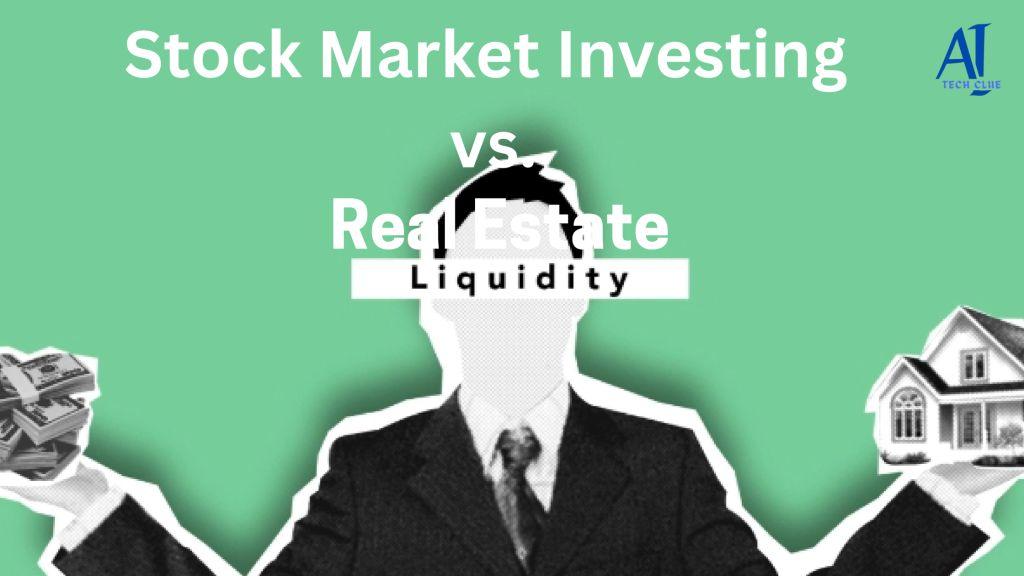When it comes to building wealth, two popular avenues often come up in discussion: stock market investing and real estate. Both have the potential to generate significant returns, but each comes with its own set of risks and advantages. So, which is the better option? Let’s dive deep into both investment strategies to help you make an informed decision.
“Stock Market Investing vs. Real Estate: Which Is Better?” want to read in Hindi Click here
What Is Stock Market Investing?
Definition and How It Works
Stock market investing involves buying shares of publicly traded companies. When you buy a stock, you’re purchasing partial ownership in that company. The value of your investment fluctuates based on the company’s performance and overall market conditions.
Types of Stocks
There are two primary types of stocks:
- Common Stocks: These offer ownership in a company with voting rights but come with higher risk.
- Preferred Stocks: While lacking voting rights, these tend to provide a more consistent dividend.
Stock Market Returns Over Time
The stock market has historically provided significant returns, averaging about 7-10% annually over the long term. However, this comes with considerable volatility, with prices swinging up and down, sometimes dramatically, in response to market news or economic changes.
Historical Performance and Average Returns
Long-term investors in the stock market have enjoyed strong returns, but short-term movements can be unpredictable. For instance, a market downturn can quickly reduce portfolio value, but historically, the market tends to recover and grow over the years.
What Is Real Estate Investing?

Definition and Different Types of Real Estate Investments
Real estate investing involves buying, owning, or managing property to generate income or appreciation. It can range from residential homes to commercial properties or even real estate investment trusts (REITs).
Residential vs. Commercial Real Estate
- Residential Real Estate: This includes homes and apartments rented to tenants, offering steady rental income.
- Commercial Real Estate: Involves office buildings, retail spaces, and warehouses, generally providing higher returns but requiring larger capital and management.
Real Estate Appreciation and Rental Income
Real estate values tend to appreciate over time, providing owners with capital gains. Additionally, properties can generate rental income, which is often viewed as a more stable and predictable revenue source compared to stock dividends.
Risk Factors
Risks in Stock Market Investing
The stock market is subject to high volatility, meaning the value of investments can swing significantly in a short period. Factors like economic downturns, inflation, and corporate scandals can rapidly impact stock prices.
Risks in Real Estate Investing
Real estate, while more stable in many cases, comes with its own risks. These include market crashes, liquidity issues, and property-specific risks like vacancies or damage.
Returns Comparison
Stock Market Returns Over Time
As mentioned earlier, stock market returns have historically averaged 7-10% per year. However, these returns are not guaranteed, and the market can experience significant downturns.
Real Estate Returns Over Time
Real estate typically provides lower, but more stable, returns. Appreciation rates vary depending on the location and type of property, but rental income often provides a steady cash flow.
Factors Impacting Returns in Both Investments
In both stocks and real estate, the economy, interest rates, inflation, and even geopolitical factors play a role in determining the returns you might see.
Liquidity and Accessibility
Liquidity in Stock Market
One of the biggest advantages of the stock market is liquidity. Stocks can be bought or sold quickly, often within minutes, allowing investors to access their money when needed.
Liquidity in Real Estate
Real estate is far less liquid. Selling a property can take months, and transaction costs are significantly higher, including agent commissions and closing fees.
Investment Horizon and Time Commitment
Short-Term vs. Long-Term Investing in Stocks
Stocks can be suitable for both short-term and long-term investments, but long-term strategies tend to yield better results, as short-term market fluctuations can be hard to predict.
Long-Term Commitment in Real Estate
Real estate is generally considered a long-term investment. Property values typically rise over time, but immediate returns are often seen through rental income.
Active vs. Passive Management
Stock investing can be more passive if you opt for mutual funds or ETFs, while real estate often requires active management, especially if you’re dealing with tenants and property maintenance.
Tax Implications
Taxes in Stock Market Investments
Stock investors face capital gains taxes when they sell their shares at a profit, as well as taxes on dividends.
Taxes in Real Estate
Real estate investors must consider property taxes, depreciation, and capital gains taxes, but they may also benefit from tax deductions on mortgage interest and maintenance expenses.
Diversification and Portfolio Balance
Diversifying in Stocks
Stocks allow for easy diversification across sectors, countries, and industries, helping investors manage risk.
Diversifying with Real Estate
In real estate, you can diversify by investing in different types of properties or in different locations. Additionally, REITs offer a way to gain real estate exposure without direct ownership.
Costs and Fees
Costs Associated with Stock Market Investing
Brokerage fees, account management fees, and taxes are common costs for stock investors.
Costs Associated with Real Estate
Real estate comes with several costs, such as property management fees, maintenance costs, and the expenses associated with buying or selling property.
Inflation Hedge
Stocks as a Hedge Against Inflation
Stocks tend to perform well during inflationary periods, as companies can pass increased costs onto consumers.
**Real Estate as a Hedge
Against Inflation**
Real estate also offers a hedge against inflation, as property values and rental income typically increase with inflation over time.
Impact of Economic Cycles
How Economic Cycles Affect Stock Market
Stock prices are highly sensitive to economic cycles, with recessions typically leading to significant declines in market value.
How Economic Cycles Impact Real Estate
Real estate is also impacted by economic cycles, though often in different ways. Property values may drop during recessions, but rental income can remain steady, providing a buffer.
Pros and Cons of Stock Market Investing
Pros
- High liquidity
- Low barriers to entry
- Diversification options
Cons
- High volatility
- Requires market knowledge
Pros and Cons of Real Estate Investing
Pros
- Tangible asset
- Steady income through rents
- Inflation hedge
Cons
- High entry costs
- Management responsibilities
Conclusion: Which Is Better?
Ultimately, the choice between stock market investing and real estate depends on your personal financial goals, risk tolerance, and time horizon. Stocks offer higher liquidity and potential for rapid growth, while real estate provides stability and consistent income. Many investors choose to balance their portfolios by investing in both.
How to Start Investing in the Indian Stock Market
FAQs
1. Which is safer: stocks or real estate?
Both have their risks, but real estate is generally considered more stable.
2. Can you invest in both stocks and real estate?
Yes, diversifying into both can offer balanced risk and returns.
3. Which one gives higher returns in the long term?
Stocks have historically provided higher long-term returns, but real estate offers more consistent cash flow.
4. How does inflation affect the stock market and real estate?
Both can act as hedges against inflation, though stocks may be more volatile.
5. Is real estate better for passive income?
Yes, real estate often generates steady rental income.

